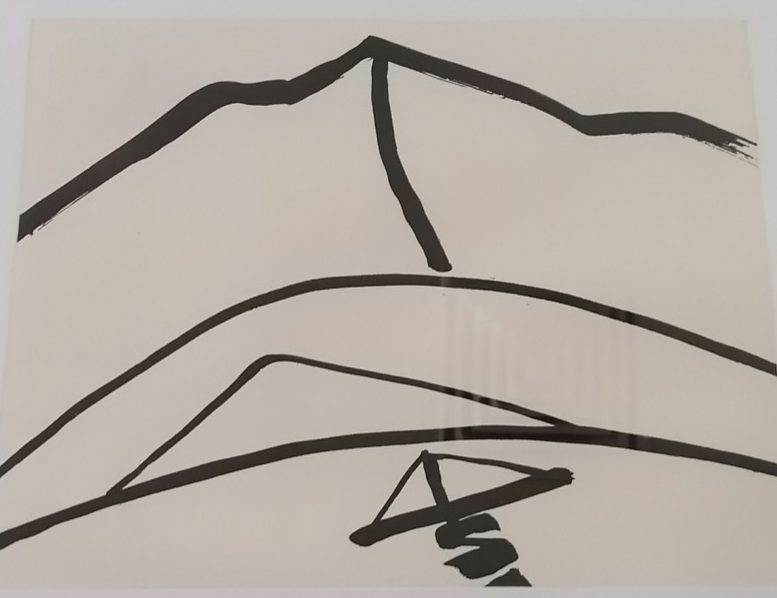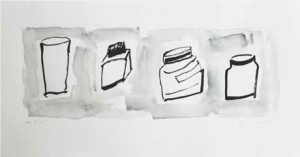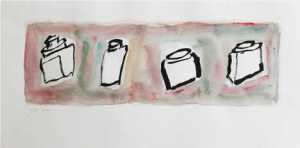
Etel Adnan:
I went to Ahliah School in l947 when I was 22 years old. The school was adding the teaching of the French language, and I was hired for two grades. I taught for two years because, by then, I had a scholarship to study in Paris. Those two years at Ahliah left a permanent impact on my life. We were then living under French rule, having only very recently acquired independence. The country was somehow divided between people yearning for independence and self-expression and those that are fiercely pro-French. I did not yet understand what was going on in the region, but I found an answer, a solution, a peace, in Ahliah. I had gone to schools run by French nuns in Beirut and sensed their near-arrogance towards the “natives” – a strange situation, strange to me, at least. Unfortunately, the nuns had made me uncomfortable throughout my childhood. At Ahliah, I was impressed by the personalities of Wadad Makdissi Cortas, the Director, and of her sister, Salma Makdissi, who, single -handedly (almost) were supervising the school. I found that being at Ahliah saved me and gave me an inner peace that I felt I must have been lacking.

The two French schools I had attended in my childhood during the 1930s, exuded a kind of condescendence, if not disdain, toward Islamic culture. They conveyed the feeling that if you were not “francophone” you were somehow not yet civilized! As my father was Muslim and not French educated, I suffered from being racialized. In contrast, at Ahliah, I found an administration, teachers, and students who were not “colonized,” who were at ease with themselves and others, both in a traditional and modern sense, and open to all religions and ethnicities on an equal basis. This was a revelation for me. It was fully what people want and hope to find in Lebanon: A genuine place for a friendly encounter between people from different religious and social backgrounds and even different countries. I encountered and found human empathy and acceptance at Ahliah because students from around the Arab orld came to Ahliah. I had never discovered such a harmonious environment before this time and during my (long) life. After Paris, I traveled to California, to study first, then teach in a college north of San Francisco. I used to return to Lebanon every two or three years, for the summer.
When I returned, I would always attend the Baalbek Festival. I had no family left in Beirut, as my father had died the year I went to Ahliah, and my mother 10 years later. Since I had relatives only outside the country, coming back to Beirut was both a pleasure and a reason for sadness because Lebanon is a country where family ties are very conspicuous. Therefore, it was difficult for me to be both at home and lonely. Thus, for my entire life, my real family was my friends. Some of my friends included my classmates; a friend who had been my student at Ahiah and was some seven years younger; and Wadad Baroody Lahoud, founding Pincipal of a School for the blind and deaf, niece of Wadad Cortas and her sister, whom everyone called Auntie Salma or Sitt Salma. Every time I was in Lebanon, I visited them often and often stayed with Wadad Lahhoud in Hamra, Ras Beirut.

I enjoyed seeing the Cortas children growing up and Sitt Salma with her incredible power and smile that made her visitors feel so welcome and at home. I always had, from the beginning, an unbounded admiration for Ahliah and what it stood for. It was and still is, what I always hoped to be realized for Lebanon and the whole Arab world, namely, to have citizens not overly impressed by the big powers nor somehow looking down on poorer nations but instead having, the genuine human equality, in essence When in Ahliah, I discovered a new world, learning as much, and certainly infinitely more, than I was teaching. It was at Ahliah where I became aware of the beauty of the Arabic language. At home, my family spoke Greek and Turkish, my father having been a top Ottoman officer while Arabic was the language spoken by Wadad, Salma, the teachers, the students and all others at Ahliah.

I also discovered the beauty of being “moral” at Ahliah as there was a high standard of integrity in everything that was done. So it happened that, throughout the years, I kept in touch with those I had known at Ahliah. And I kept alive the memory of what they had been there for me. I admired these two women leading Ahliah, Wadad and Salma, and what they had done and stood for. For me, these women were the two people I loved and admired most throughout my life, and their legacy lives on in Ahliah today. Ahliah, having been for a time in the midst of destruction, survived the civil war and continues to preserve the spirit of human empathy, equality, and excellence that were the hallmark of its earlier days. For me and many others, Ahliah represents a beacon in a dark world.